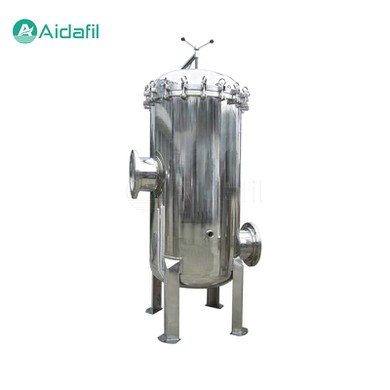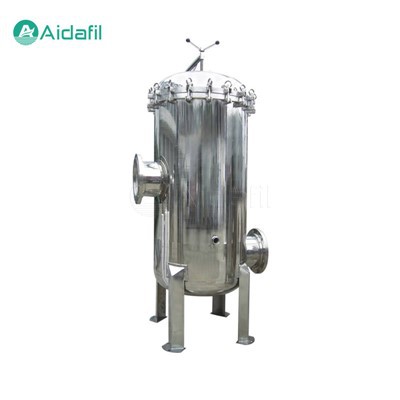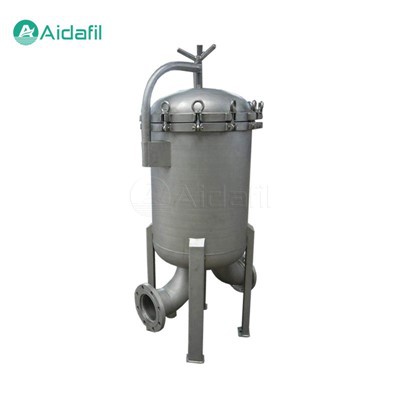
High Precision Security Filter
Composed of a stainless-steel housing and a filter cartridge, the high precision security filter allows liquids or gases to flow from the outside to the inside through the cartridge. The collected fluid then exits through a central outlet, while contaminants are trapped on the cartridge's exterior, achieving effective filtration and purification.

The security filter, also known as precision filter, is a device used to filter impurities in fluids. It is widely used in chemical, petroleum, pharmaceutical, food, water treatment and other industries to protect key equipment (such as pumps, valves, meters, etc.) and improve product quality. The main function of security filter is to remove solid particles, colloids, suspended solids and other impurities in the fluid to ensure the safe operation of the system and improve the quality of products.
The high precision security filter operate after the multi-media pre-treatment filtration process and before membrane filtration equipment such as reverse osmosis and ultrafiltration. Their primary function is to remove fine substances left after multi-media filtration to ensure the precision of water filtration and protect membrane filtration elements from damage caused by large particles.
Technical Parameters
|
Number of filter elements |
3 |
5 |
7 |
12 |
20 |
25 |
30 |
36 |
42 |
51 |
60 |
72 |
123 |
|
Flow rate |
3 |
5-10 |
7-14 |
12-24 |
40 |
50 |
60 |
72 |
90 |
102 |
120 |
144 |
246 |
Components of Security Filters
The high precision security filter consists of two main components:
1. Stainless Steel Housing. This robust housing provides structural support and protection for the filter cartridge. Its durable construction ensures longevity and resistance to corrosion, making it suitable for various industrial environments.
2. Filter Cartridge. The filter cartridge is the core component responsible for trapping impurities and particles. It is designed with a porous structure that allows fluid to pass through while retaining contaminants on its surface. Filter cartridges come in different materials and configurations to cater to specific filtration requirements.
Working Principle
The working principle of high precision security filters is based on the concept of depth filtration. As the fluid flows from the outside to the inside of the filter cartridge, particles larger than the filter's pore size are trapped on the outer surface, while smaller particles and clean fluid pass through the cartridge's depth. This process ensures efficient removal of contaminants and maintains the desired level of filtration precision.
Advantages of High Precision Security Filters
1. High filtration accuracy. Removes fine particles that escape multi-media filtration.
2. Protection of downstream membrane elements. Prevents damage to expensive membrane elements caused by large particles.
3. Improved water quality. Ensures high-quality filtered water for various industrial and commercial applications.
4. Reduced maintenance costs. Regular maintenance helps extend the lifespan of downstream equipment, reducing overall maintenance costs.
5. Compliance with regulations. Meets industry standards and regulatory requirements for water filtration.
Applications
The high precision security filter finds find application in various industries, including:
1. Water Treatment. They are extensively used in water treatment plants for purifying drinking water, wastewater treatment, and industrial process water filtration.
2. Food and Beverage. Security filters play a vital role in ensuring the quality and safety of food and beverage products by removing impurities and contaminants from process water and ingredients.
3. Pharmaceuticals. In the pharmaceutical industry, security filters are employed to achieve stringent purity standards in drug manufacturing processes, ensuring the safety and efficacy of pharmaceutical products.
4. Chemicals and Petrochemicals. These filters are utilized for removing impurities from chemical and petrochemical process streams, safeguarding equipment and enhancing product quality.
The following points need to be noted when using the security filter:
1. Select the appropriate filtration accuracy and filtration efficiency to meet the filtration requirements of the system.
2. According to the nature of the fluid and the content of impurities, choose the appropriate filter medium and structural form.
3. Regularly check the operating status of the filter, such as pressure difference, flow rate, etc., in order to detect problems and deal with them in a timely manner.
4. Regularly replace the filter media to ensure the filtration effect and extend the service life of the equipment.
5. During installation and maintenance, pay attention to maintaining the cleanliness and sealing performance of the equipment to avoid impurities from entering the system.
FAQ
1. Q: What is the function of a filter?
A: The main function of a filter is to remove solid particles, impurities, and harmful substances from liquids or gases, in order to achieve purification, clarification, and protection of equipment.
2. Q: How to choose a suitable filter?
A: When choosing a filter, factors such as the properties of the material being filtered (e.g., viscosity, temperature, corrosion), required filtration accuracy, processing capacity, operating pressure and medium, as well as the type, material, size, and installation method of the filter should be considered.
3. Q: What is the working principle of a filter?
A: The working principle of a filter mainly relies on physical screening, deep interception, absorption, or chemical reactions to remove impurities or harmful components from the material being filtered.
4. Q: How to maintain and care for a filter?
A: Maintenance of filters includes regular cleaning or replacement of filter elements, inspection of seals and fasteners, maintaining stable operating pressure, and avoiding overloading. Specific methods should be referenced from the filter's instruction manual and maintenance guides.
5. Q: What is the service life of a filter?
A: The service life of a filter depends on its working environment, processing volume, and filtration accuracy. Generally, when the filter's pressure drop reaches a certain value or the filtration effect decreases significantly, it needs to be replaced or cleaned.
6. Q: What should be paid attention to during filter installation?
A: During filter installation, attention should be paid to the directionality, ensuring that the fluid enters and exits from the correct ports. Also, the piping system should be cleaned before installation, and the filter should be securely fastened and sealed as required by the instructions.
7. Q: What is the replacement cycle for filters?
A: The replacement cycle for filters depends on their working conditions and filtration requirements, and is usually indicated by pressure difference indicators or timers. When the filter's pressure drop reaches the set value or the filtration effect decreases, it should be replaced in a timely manner.
Why Choose Us
· Professional manufacturer with many years' experience
· Good quality with competitive price
· OEM & ODM are welcome
· Various payment items are acceptable
· Good service by experienced manager
AIDA Philosophy
1. Management Concept:
· Satisfy the customers' demand --- Touch customers, trust with our products and services
· Make employees happy --- Pursue higher material and spiritual happiness
2. Company Mission:
· Focus on customer needs, provide best filtering solution
· To be the lifelong partner with customers
3. Corporate Vision:
· Become a global purification leadership brand
4. Values:
· Customer: Pursue the ultimate experience, enjoy excellent quality
· Team: Trust, responsibility, growth, win-win
· Work: Simple, sincere, efficient, dedicated
Hot Tags: high precision security filter, China, factory, price, buy, reliable oil coalescing filter, medical oil coalescing filter, hydraulic transformer oil filter cartridge, oil mist filter in air compressor system, multi layer sintered wire mesh, dryer filter for air compress







